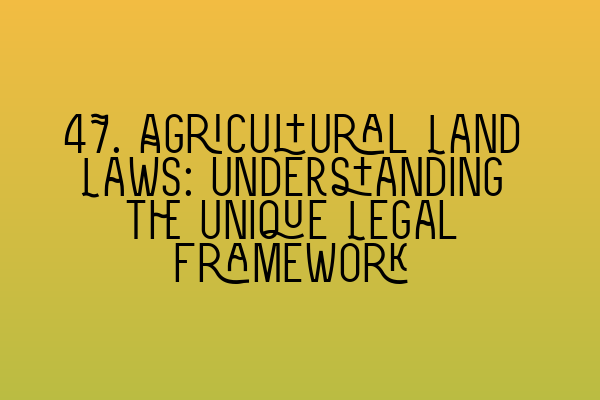47. Agricultural Land Laws: Understanding the Unique Legal Framework
Welcome to the SQE Property Law & Land Law blog! In this post, we will be delving into the complex and fascinating world of agricultural land laws. As a solicitor practicing in property law, it is important to have a solid understanding of the unique legal framework that governs agricultural land and its related issues.
Before we dive into the details, let’s start with a brief overview of what agricultural land is and why it requires specific laws and regulations. Agricultural land refers to land that is primarily used for agricultural purposes, such as farming, ranching, or forestry. It plays a crucial role in providing food and resources to sustain our society.
Now, let’s explore some key aspects of agricultural land laws and the legal framework surrounding them:
1. Ownership and Transfer of Agricultural Land
The ownership and transfer of agricultural land are subject to specific legal provisions. It is important to understand the intricacies of buying, selling, and transferring agricultural land, as there may be additional requirements and restrictions imposed by law.
SQE 1 Practice Exam Questions: If you are preparing for the SQE 1 exam, make sure to familiarize yourself with the practice exam questions to test your knowledge and understanding of agricultural land laws.
2. Agricultural Leases and Tenancies
Agricultural leases and tenancies are a common way for farmers and landowners to establish legal agreements for the use of agricultural land. These agreements typically involve long-term leases or tenancies, and they come with their own set of legal requirements and protections.
3. Agricultural Subsidies and Grants
The agricultural sector often relies on subsidies and grants provided by the government to support farmers and encourage sustainable agricultural practices. Understanding the eligibility criteria, application process, and legal obligations associated with these subsidies and grants is crucial for advising clients in the agricultural industry.
SQE 1 Practice Mocks FLK1 FLK2: For comprehensive preparation for the SQE 1 exam, including agricultural subsidies and grants, take a look at our practice mocks.
4. Environmental Regulations
Given the significant impact of agricultural activities on the environment, there are specific environmental regulations and considerations that apply to agricultural land. These regulations aim to promote sustainable farming practices, protect natural resources, and prevent pollution.
5. Succession Planning
Succession planning is a critical aspect of agricultural land law. Family farms often require careful planning to ensure a smooth transition of ownership and management. Understanding the legal and tax implications of succession planning is essential for advising agricultural clients.
6. EU and UK Agricultural Policies
With Brexit and the UK’s departure from the European Union, there have been significant changes in agricultural policies and regulations. Staying up-to-date with the latest developments in EU and UK agricultural policies is crucial for providing accurate and informed legal advice.
SQE 2 Preparation Courses: Prepare yourself for the SQE exams with our comprehensive SQE 2 preparation courses, including in-depth coverage of EU and UK agricultural policies.
Conclusion
Understanding the unique legal framework surrounding agricultural land is essential for solicitors practicing in property law. As we have explored in this blog post, agricultural land laws cover a range of topics, including ownership and transfer, leases and tenancies, subsidies and grants, environmental regulations, succession planning, and agricultural policies.
SRA SQE Exam Dates: If you are planning to take the SQE exams, make sure to check out the official SRA SQE exam dates for your preparation.
Thank you for reading our blog post on agricultural land laws. We hope that you found this information useful and insightful. If you have any questions or would like further guidance on agricultural land laws or any other property law matters, please don’t hesitate to contact us at SQE Property Law & Land Law.
